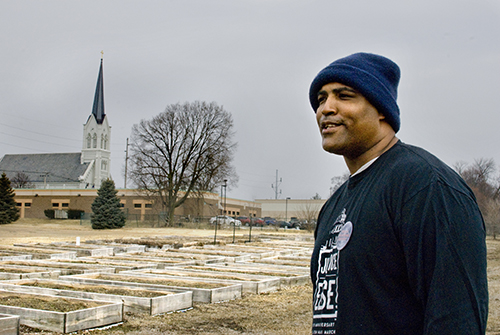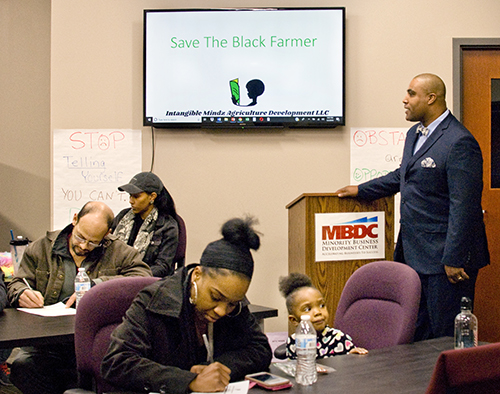
Dwayne Harris, director of the internship program at Well Farm, assesses the raised beds and prepares for his seed order and mulch delivery. Harris, an accountant, said agriculture can provide jobs and entrepreneurial opportunities for people who are unemployed or underemployed. (PHOTO BY CLARE HOWARD)
Save the Black Farmer.
Harris explains that following the end of the Civil War, the primary occupation for former slaves was working for white landowners. Tenant farming and sharecropping were often little better than enslavement. The Great Migration occurred as Black Americans started moving north for union factory jobs.
Fast forward 150 years and factories are closing and manufacturing jobs are moving overseas. Unemployment rates among African Americans are higher than among other demographics.
Yet the legacy of enslavement still hangs over farming for many African Americans.
“We are 13 to 15 percent of the population but less than 2 percent of farmers. Over 40 percent of Black farmers are over the age of 70, and 80 percent of Black farmers make less than $10,000 a year,” Harris said.
And he’s equipped to change that with marketing, budgeting, accounting and hands-on farm apprenticeships. He wants to dispel the negative legacy of farming and transform it into power and entrepreneurship.
“We have to take our mouths and our stomachs away from big corporations and live better and healthier with more employment opportunities,” Harris told his first class of interns for the agriculture apprenticeship program at Well Farm at Voris Field.
Well Farm, 1013 S.W. Reed Ave. south of the Peoria Civic Center, is part of Peoria’s new green infrastructure designed to deal with combined sewer overflow. The farm’s 100 raised vegetable beds use regular city water, but the farm’s trees are rooted in a bioswale that absorbs water runoff during heavy rains.
The property had been vacant and was developed using grant funding. The first growing season at Well Farm was 2018.
Harris, 42, is an accountant by profession whose seasonal tax work in winter is balanced with his warmer weather work as director of the apprenticeship program at Well Farm.

Dwayne Harris speaks about the internship program at Well Farm. (PHOTO BY CLARE HOWARD)
In attendance was Riley Parker, a baker and restaurateur, who said she was tired of spending $15 for a few sprigs of basil. She wants to supply her business, Riley’s Vegan Eats and Sweets located inside Sweet Cakes by Rachael, 1233 W. Brons Ave., with fresh herbs and vegetables that she grows.
Harris loves to hear that.
“Everyone needs food. That’s our market,” he told the class. “We will see obstacles as opportunities and the farmer as the life engine.”
Harris began selling dried beans, rice and flour in his community when he was 17.
“Kroger moved out, and 61605 is a food desert, but I don’t want to see another food pantry open here,” he said. “Look around and see the Black community getting sicker. See the vacant lots and see opportunity. We will raise vegetables with no pesticides. If the bugs don’t eat it, we shouldn’t eat it.
“But this program is not just about having a raised bed in your backyard. This is about how to grow for economic purposes. We will learn about a CSA (community supported agriculture) program. We will learn how to grow this food and what it does in our bodies.”
Tory Dahlhoff, rural development coordinator with the Peoria Area Economic Development Council, said, “We want to use regional food and agriculture systems as a driver of economic progress. More regional production helps us establish a sustainable regional food system and provides jobs.”
At the end of the first class, Harris’ wife, Sherry Gordon-Harris, said, “I’m a returning apprentice from last year growing okra, kale, collard greens, peppers, herbs. I’m kind of a princess and don’t like to get dirty, but I’ll be on my hands and knees with my pink gardening gloves.”

1 comment for “Save the Black farmer”